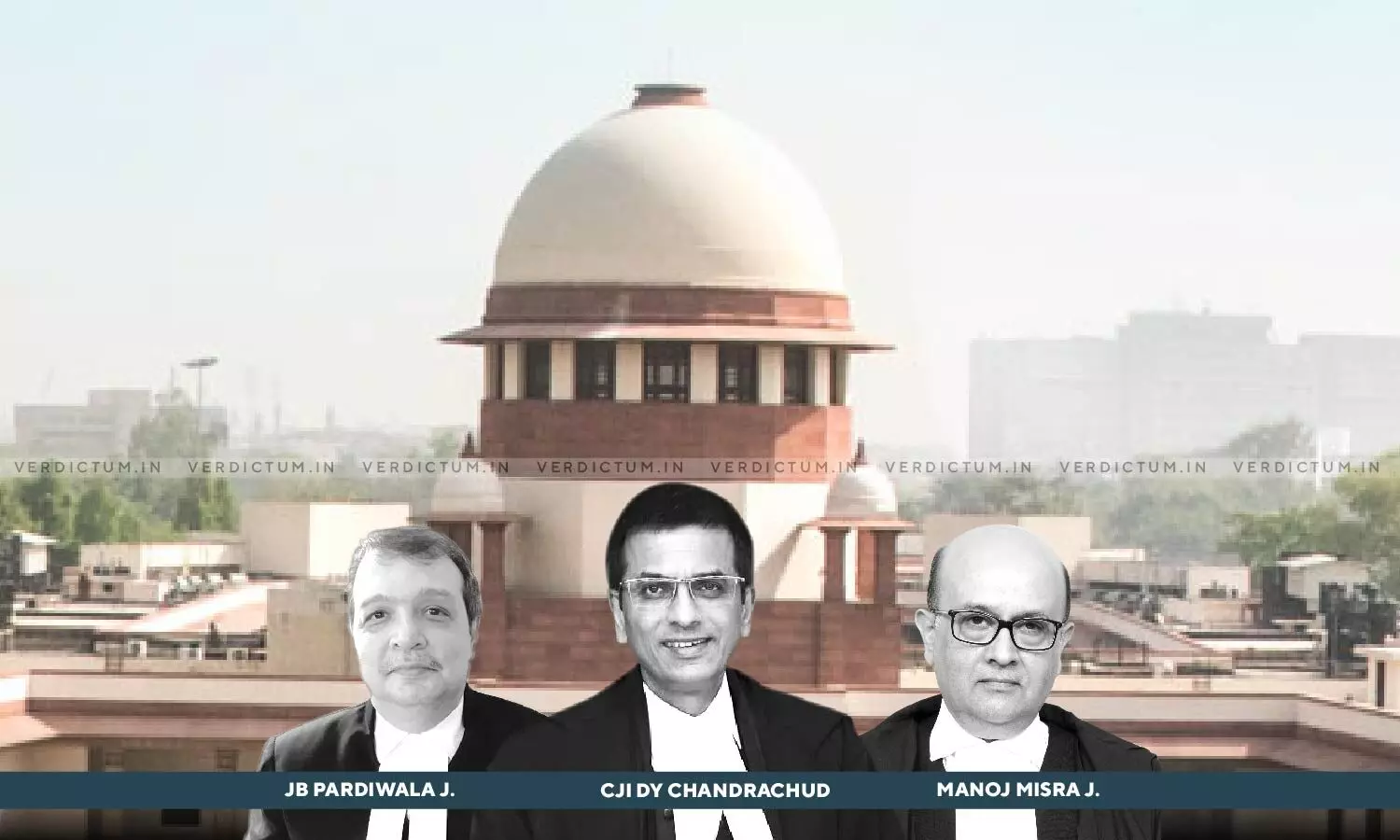
Judicial Scrutiny At Stage Of Section 11 A&C Act Limited Solely To Prima Facie Determination Of Existence Of Arbitration Agreement: SC
 |
|The Supreme Court ruled that the 2015 amendment to the Arbitration & Conciliation Act, 1996 limits the judicial scrutiny at the stage of Section 11 solely to the prima facie determination of the existence of an arbitration agreement.
The Apex Court set aside an order of the Bombay High Court in light of the fact that it undertook a detailed examination of the factual matrix.
The Bench comprising Chief Justice D.Y. Chandrachud, Justice J.B. Pardiwala and Justice Manoj Misra asserted, “We must clarify that the limited jurisdiction of the referral Courts under Section 11 must not be misused by parties in order to force other parties to the arbitration agreement to participate in a time-consuming and costly arbitration process. This is possible in instances, including but not limited to, where the claimant canvasses the adjudication of non-existent and mala fide claims through arbitration.”
Advocate Rishi Matoliya represnted the Petitioner while Advocate Vineet Dwivedi represented the respondent.
The Apex Court was hearing an appeal assailing a Bombay High Court judgment dismissing the application preferred by Goqii Technologies Private Limited (appellant) under Section 11 of the Arbitration and Conciliation Act, 1996 seeking appointment of an arbitrator to adjudicate disputes and claims in terms of the Master Services Agreement (MSA) executed between the appellant and Sokrati Technologies Private Limited (respondent).
The appellant, a technology-based wellness venture providing lifestyle consultancy services, executed the MSA with the respondent, a subsidiary of Dentsu International Limited,to manage its digital advertising campaigns. The MSA was subsequently extended for a period of three years, with certain amendments.The appellant Company later discovered that the Economic Offences Wing, Mumbai had lodged a complaint against Dentsu International, the parent company of the respondent, alleging serious irregularities and malpractices in their service.
Thereafter, the appellant engaged an independent auditor to prepare a report on the activities of the respondent. The audit identified significant areas of concern within the media plan. The report estimated an overcharge of over Rs 4.48 crore. In light of such factual aspects, the respondent served a demand notice on the appellant under Section 8 of the Insolvency and Bankruptcy Code, 2016 (IBC) seeking Rs 6,25,67,060 towards the outstanding invoices. Citing the audit findings,the appellant rejected the demand and invoked arbitration clause under the MSA. The appellant also filed a counter claim demanding a refund of Rs 5,53,26,690 and an additional Rs 6 crore. While the application was pending, the respondent filed Company Petition under Section 9 of the IBC for initiating the corporate insolvency resolution process of the appellant.
Subsequently, upon failure of the respondent to comply with the arbitration notice, the appellant filed Commercial Arbitration Application before the High Court, seeking appointment of a sole arbitrator but the same was rejected. The High Court was of the view that although the report highlighted poor returns on investment and inconsistent metrics, yet it did not support the assertions made by the appellant regarding fraudulent practices of the respondent. Aggrieved thereby, the appellant approached the Top Court.
One of the main issues before the Bench was whether the High Court committed any error in dismissing the appellant’s application under Section 11 of the Act, 1996.
Referring to its judgments in Re: Interplay between Arbitration Agreements under the Arbitration and Conciliation Act 1996 and the Indian Stamp Act 1899 and SBI General Insurance Co. Ltd. vs. Krish Spinning [2024 INSC 532], the Bench held, “The scope of inquiry under Section 11 of the Act, 1996 is limited to ascertaining the prima facie existence of an arbitration agreement. In the present case, the High Court exceeded this limited scope by undertaking a detailed examination of the factual matrix.”
The Bench was of the view that the High Court erroneously proceeded to assess the auditor’s report in detail and dismissed the arbitration application. “In our view, such an approach does not give effect to the legislative intent behind the 2015 amendment to the Act, 1996 which limited the judicial scrutiny at the stage of Section 11 solely to the prima facie determination of the existence of an arbitration agreement”, it added.
The Bench also suggested, “With a view to balance the limited scope of judicial interference of the referral Courts with the interests of the parties who might be constrained to participate in the arbitration proceedings, the Arbitral Tribunal may direct that the costs of the arbitration shall be borne by the party which the Tribunal ultimately finds to have abused the process of law and caused unnecessary harassment to the other party to the arbitration.”
Appointing former Chief Justice of the Punjab & Haryana High Court S.J. Vazifdar, as the sole arbitrator to adjudicate the disputes between the parties, the Bench allowed the appeal and set aside the impugned order passed by the High Court of Bombay.
The Court also made it clear that the question whether there exists a valid dispute to be referred to arbitration can be addressed by the Arbitral Tribunal as a preliminary issue.
Cause Title: Goqii Technologies Private Limited vs. Sokrati Technologies Private Limited [Neutral Citation: 2024 INSC 853]
Appearance:
Petitioner: Advocate Rishi Matoliya
Respondent:Advocate Vineet Dwivedi
Click here to read/download Judgment: